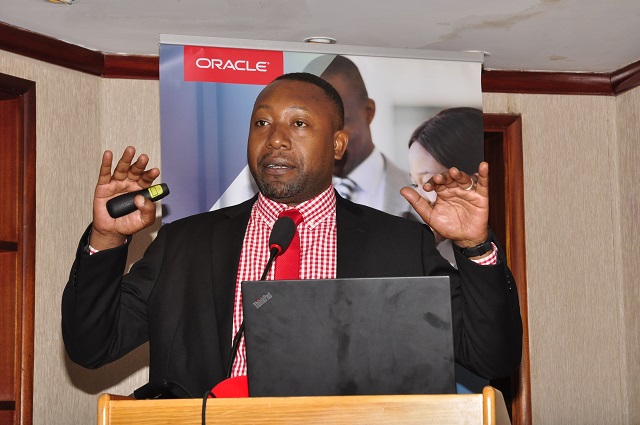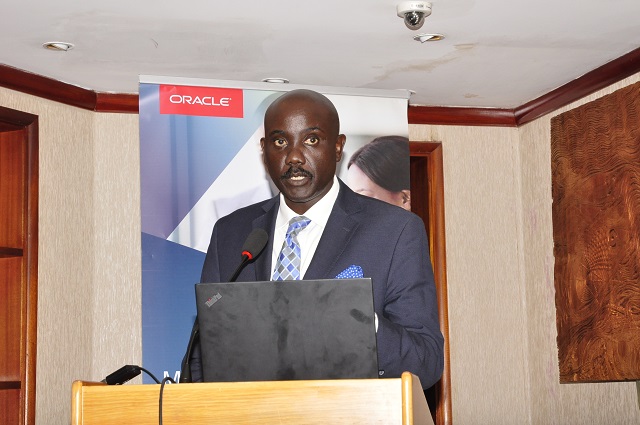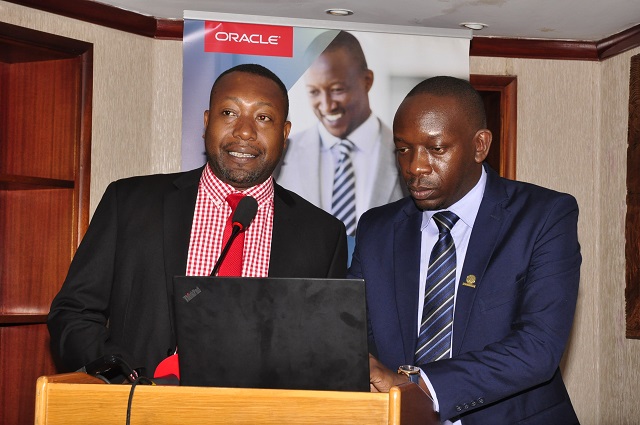The Executive Director Supervision, at Bank of Uganda, Dr Tumubweine Twinemanzi, has challenged the financial services sector to adopt a shared technology services delivery model. He argued that this cuts down the cost of doing business hence passing on those benefits to customers in the form of reduced cost of lending.

On the flip side, Oracle has developed, Cloud at Customer- a cloud-based solution that allows Ugandan based organisations to enjoy cloud services either in a colocation data centre such as
Twinemanzi advised that financial services should compete based on the quality of services and the relevance of their products to the customers. He applauded Raxio Data Center for its efforts in making a world-class shared services data centre.
What
Dr Twinemanzi, Executive Director Supervision, at Bank of UgandaRaxio is trying to do (shared services with Raxio data center) is something that is dear to my heart; something that we have been trying to do in the financial services sector. Financial institutions should focus on their core business which is intermediation- mobilising deposits and extending credit.
He advised commercial banks and other financial institutions to stick to the playing field they are used to, managing finances and let experts like Raxio data

The financial services industry in Uganda has over the last 10 years has seen an average cost to income rations rise to 74.6%, compared to 66.7% in the 10 years to 2008. As a result, average lending rates increased to a 10 year average of 22.16% from 20.39% in the same period. For this reason, Twinemanzi challenged Raxio and Oracle to explore especially introducing shared software as a service and other software solutions, such as accounting, core banking solutions and credit analysis modules.
Speaking at the event, Joachim Steuerwald, the Oracle Cloud Platform Sales Director, said with increased reliability on digital mobile solutions for virtually everything, it was it was mission critical that service providers invest significantly in reliable systems.
Many of the data centres in the region are fairly old. Before
Joachim Steuerwald, Oracle Cloud Platform Sales DirectorRaxio , we did not have any single Tier III data centre in the region and that has been a weighty limitation to achieve the kind of uptimes that a digital economy demands. This is why we’re interested in a partnership withRaxio .
We are increasingly becoming a digital economy. Customers can’t event tolerate our digital services being down for even an hour- it is just not acceptable. This requires the ICT behind those businesses to be available- 24/365. However, building these highly reliable systems requires the right environment.
Steuerwald said that adoption of cloud services in East Africa like in many other African countries in Africa has been slow, partly because of lack of an African data centre footprint which made cloud services expensive but also due to data security concerns, especially by governments, which is why Oracle is fronting the idea of localised cloud services.

This is why we thought of bringing an alternative, which we call Cloud at Customer, that basically offers the same cloud technology, but brought closer to the customer in a regional data centre such as being developed by
Joachim Steuerwald, Oracle Cloud Platform Sales DirectorRaxio or into the customers’ owned data centre as a viable alternative.
Rules of engagement and Regulation?
From a regulatory point of view, BoU is beginning to have an internal conversation on coming up with an official position on the whole idea of cloud computing.
Do we allow it, under what circumstances, who can and who cannot? What can they do and what data can they store there- at least as regards financial data. I think if we take the lead as the financial services sector regulator, it will be a question of time before other regulators come on board.
Dr Twinemanzi, Executive Director Supervision, at Bank of Uganda
Cloud services help in cost-cutting.
A 2017/2018 survey amongst government ministries, departments and agencies (MDAs) by National Information Technology Authority (NITA) showed that while a majority of MDAs agreed that cloud services had significant benefits such as reduction in ICT related costs (86.4%), simplicity of deployment (77.3%), increased productivity and flexibility in up-or down-scaling, only 28.6% of the MDAs reported using cloud computing services. Most MDAs (80.5%) reported that they host their applications and databases in-house.
However, one of the biggest hinderances is the risk of a security breach. Following closely in the cloud service huddles is the high cost of cloud computing services and uncertainty about the location of hosted data.
James Byaruhanga, the

Shared cloud services hosted in a local data centre basically provide enterprises with a scalable model, tailored to the existing computing needs of the enterprise on a pay as you grow basis.
“What we (Raxio data center) want to give you is secure shared connectivity with multiple connectivity points that will position your business to look at the future. We will give you a more efficient and differentiating service that will make your business stand out. The whole idea about shared infrastructure is to reduce the cost of cost of ownership, reduce operational expenses, allowing you to be more efficient and provide a better service to customers.”
James Byaruhanga, Raxio General Manager
Discover more from Dignited
Subscribe to get the latest posts sent to your email.











